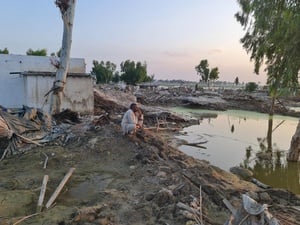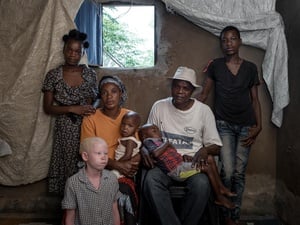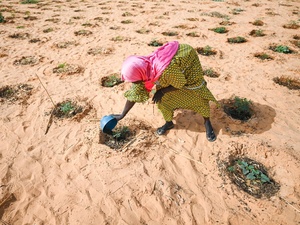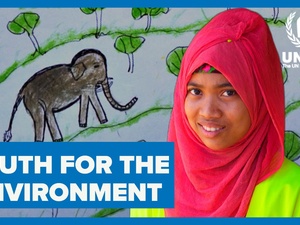Top UNHCR official warns about displacement from climate change
Top UNHCR official warns about displacement from climate change

Extreme Weather Conditions: Survivors of Cyclone Nargis wait for help in a Myanmar village.
POZNAN, Poland, December 9 (UNHCR) - Climate change could cause large-scale human displacement, the deputy head of the UN refugee agency warned this week at a conference in Poland, while calling on delegates to put a humanitarian face on this vital issue.
Deputy High Commissioner for Refugees L. Craig Johnstone said Monday at the two-week UN Climate Change Conference in Poznan that even by the most conservative predictions up to 250 million people will be displaced by the middle of this century as a result of extreme weather conditions, dwindling water reserves and a degradation of agricultural land. Many people will also be forced to flee their homes to escape fighting over meagre resources.
Johnstone, speaking in a UNHCR-organized panel discussion, said that in real terms this meant that the number of displaced would rise by a minimum of six million each year due to climate change. He said that the world needed to be prepared to help such people - this meant increasing pre-positioned stocks of aid in vulnerable areas by up to twentyfold.
"The most important issue is mitigation by reducing greenhouse gases. The second line of action is adaptation to climate change, as promoted by development agencies," said Johnstone. "But if these fail, we need to anticipate the humanitarian response. And this is still missing in the debate."
The Deputy High Commissioner said he was speaking with the authority of an organization that has wide experience of working with communities vulnerable to climate change, including drought, floods and storms. "As we speak, UNHCR is helping the victims of large floods in Yemen. This is way out of our mandate, but we are there and we have the capacity to help," he added.
The United Nations-led negotiations in Poznan are aimed at helping reach a global climate change deal next year in Copenhagen. Some 9,000 participants from governments, business and industry, environmental groups and research institutions are attending the meeting, which ends on Friday.
Philippe Boncour, who heads the international dialogue on migration division at the International Organization for Migration (IOM), spoke at Monday's event about the adaptation of vulnerable communities to climate change. He said it was hard to draw a line between forced and voluntary migration when livelihoods were jeopardized by climate changes.
Meanwhile, Niels Scott from the UN Office for the Coordination of Humanitarian Affairs (OCHA), said that his organization anticipated that climate change would act as a "threat-multiplier" exacerbating the struggle for resources and armed conflicts
Norwegian Refugee Council Secretary General Elisabeth Rasmusson warned of a vicious circle whereby climate-induced disasters and degradation resulted in conflicts and conflicts led in turn to further natural disasters and degradation.
By Melita H. Sunjic in Poznan, Poland









